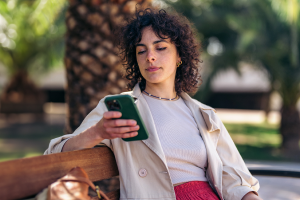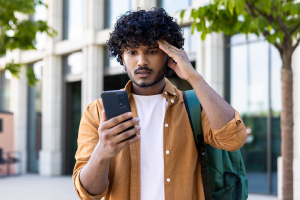In the ever-growing digital age, our mobile devices contain an alarming amount of personal, sensitive data. From emails, social media accounts, banking applications to payment apps, our personal and financial lives are increasingly entwined with the convenience of online, mobile platforms. However, despite the increasing threat to cyber security, it appears many of us are complacent about protecting our mobile devices.
Survey revealed that many mobile users still use easy-to-remember and easy-to-guess passwords. With such an increasing dependence on mobile devices to handle our daily tasks, it seems unimaginable that many of us leave our important personal data unguarded. Theft or loss of an unsecured mobile device can, and often does, result in a catastrophic loss of privacy and financial security.
Mobile Device Security
The unfortunate reality of our digital era is that devices are lost, misplaced, or stolen every day. A mobile device without password protection is a gold mine for anyone with malicious intent. According to a global survey by McAfee and One Poll, many consumers are largely unconcerned about the security of their personal data stored on mobile devices. To illustrate, only one in five respondents had backed up data on their tablet or smartphone. Even more concerning, 15% admitted they saved password information on their phone.
Such statistics are troubling for several reasons. The most obvious is the risk of personal information —including banking details and online login credentials— falling into the wrong hands. A lost or stolen device is not just a device lost— it’s potentially an identity, a bank account, or worse. The lack of urgency in securing data on mobile devices speaks to a broad consumer misunderstanding about the severity of the threats posed by cybercriminals and the ease with which they can exploit an unprotected device.
→ Dig Deeper: McAfee 2023 Consumer Mobile Threat Report
The Gender Disparity in Mobile Device Security
Perhaps one of the most surprising findings of the survey is the difference in mobile security behaviors between men and women. This difference illustrates not just a disparity in the type of personal information each group holds dear, but also the degree of risk each is willing to accept with their mobile devices.
Broadly speaking, men tend to place greater value on the content stored on their devices, such as photos, videos, and contact lists. Women, on the other hand, appear more concerned about the potential loss of access to social media accounts and personal communication tools like email. They are statistically more likely to experience online harassment and privacy breaches. This could explain why they are more concerned about the security of their social media accounts, as maintaining control over their online presence can be a way to protect against harassment and maintain a sense of safety.
The loss of a mobile device, which for many individuals has become an extension of their social identity, can disrupt daily life significantly. This distinction illustrates that the consequences of lost or stolen mobile devices are not just financial, but social and emotional as well.
Risky Behaviors Persist
Despite the differences in what we value on our mobile devices, the survey showed a worrying level of risky behavior from both genders. Over half (55%) of respondents admitted sharing their passwords or PIN with others, including their children. This behavior not only leaves devices and data at risk of unauthorized access but also contributes to a wider culture of complacency around mobile security.
Password protection offers a fundamental layer of security for devices, yet many people still choose convenience over safety. Setting a password or PIN isn’t a failsafe method for keeping your data safe. However, it is a simple and effective starting point in the broader effort to protect our digital lives.
→ Dig Deeper: Put a PIN on It: Securing Your Mobile Devices
Steps to Mobile Device Security
While the survey results raise an alarm, the good news is that we can turn things around. It all begins with acknowledging the risks of leaving our mobile devices unprotected. There are simple steps that can be taken to ramp up the security of your devices and protect your personal information.
First and foremost, password-protect all your devices. This means going beyond your mobile phone to include tablets and any other portable, internet-capable devices you may use. And, while setting a password, avoid easy ones like “1234” or “1111”. These are the first combinations a hacker will try. The more complex your password is, the sturdier a barrier it forms against unauthorized access.
Another important step is to avoid using the “remember me” function on your apps or mobile web browser. Although it might seem convenient to stay logged into your accounts for quick access, this considerably amplifies the risk if your device gets stolen or lost. It’s crucial to ensure you log out of your accounts whenever not in use. This includes email, social media, banking, payment apps, and any other accounts linked to sensitive information.
McAfee Pro Tip: If your phone is lost or stolen, employing a combination of tracking your device, locking it remotely, and erasing its data can safeguard both your phone and the information it contains. Learn more tips on how to protect your mobile device from loss and theft.
Sharing your PIN or password is also a risky behavior that should be discouraged. Admittedly, this might be challenging to implement, especially with family members or close friends. But the potential harm it can prevent in the long run far outweighs the temporary convenience it might present.
Investing in Mobile Security Products
Having highlighted the importance of individual action towards secure mobile practices, it’s worth noting that investing in reliable security software can also make a world of difference. A mobile security product like McAfee Mobile Security, which offers anti-malware, web protection, and app protection, can provide a crucial extra layer of defense.
With app protection, not only are you alerted if your apps are accessing information on your mobile that they shouldn’t, but in the event that someone does unlock your device, your personal information remains safe by locking some or all of your apps. This means that even if your device falls into the wrong hands, they still won’t be able to access your crucial information.
It’s also critical to stay educated on the latest ways to protect your mobile device. Cyber threats evolve constantly, and awareness is your first line of defense. McAfee has designed a comprehensive approach to make the process of learning about mobile security not just informative but also engaging. Our array of resources includes a rich repository of blogs, insightful reports, and informative guides. These materials are meticulously crafted to provide users with a wealth of knowledge on how to protect their mobile devices, ensuring that the learning experience is not only informative but also engaging and enjoyable.
Final Thoughts
While the current state of mobile device security may seem concerning, it’s far from hopeless. By incorporating simple security practices such as setting complex passwords and avoiding shared access, we can significantly reduce the risk of unauthorized data access. Additionally, investing in trusted mobile security products like McAfee Mobile Security can provide a robust defense against advancing cyber threats. Remember, our digital lives mirror our real lives – just as we lock and secure our homes, so too must we protect our mobile devices.











